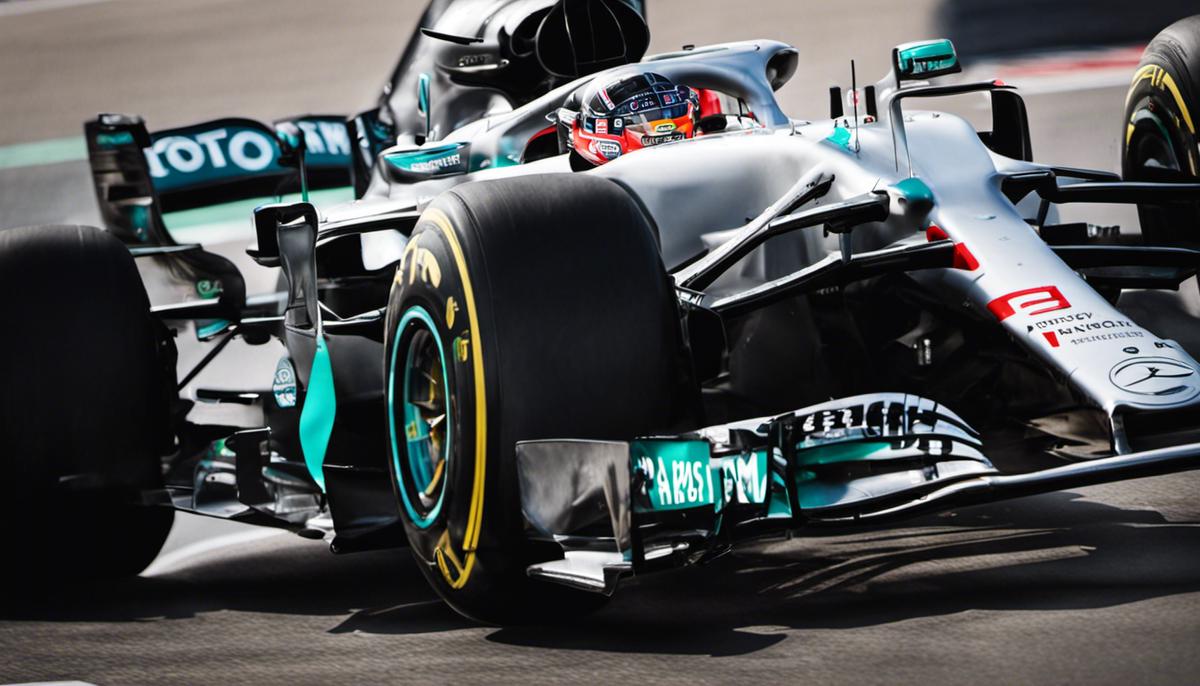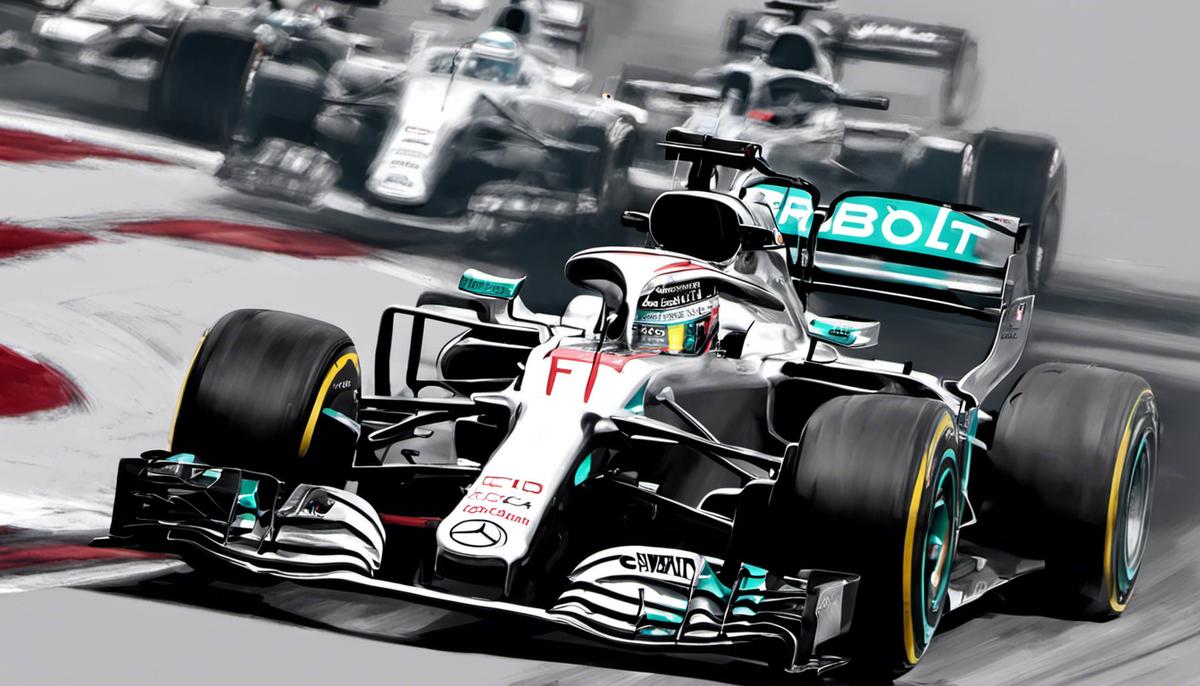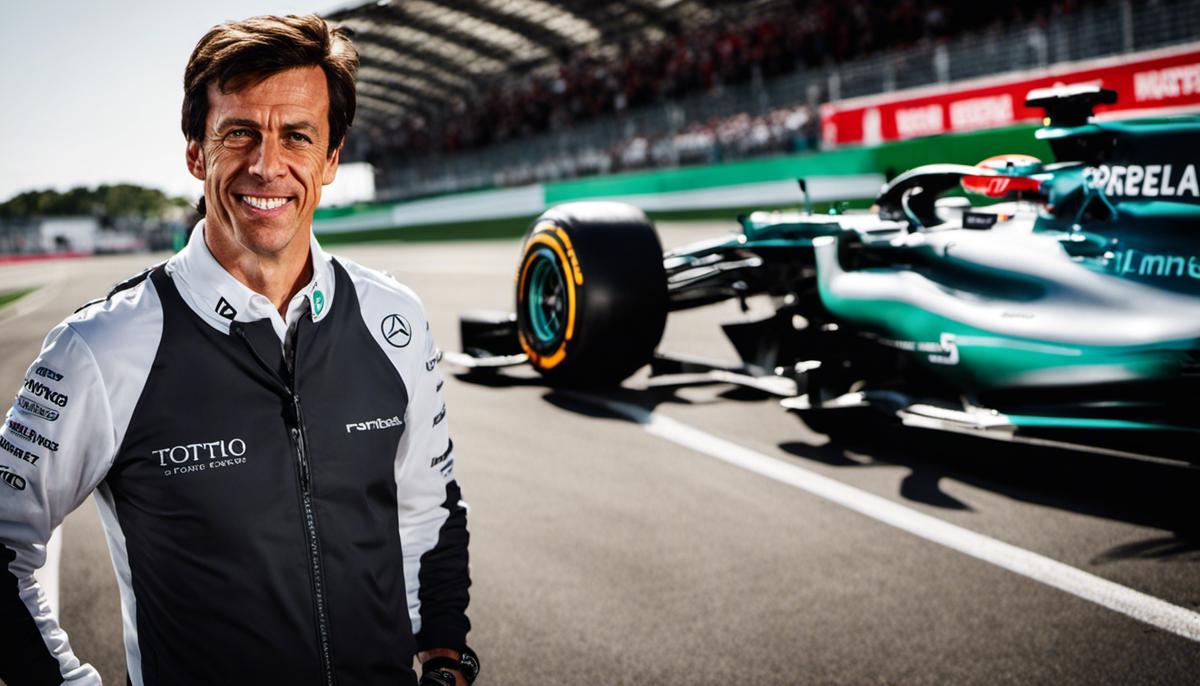Behind every successful sports team, there stands a formidable and tenacious leader, guiding the course of the team’s journey towards triumph. The Mercedes AMG Petronas Formula One Team is no exception. Its towering victories and unshakeable dominance in recent years can be attributed to its Team Principal and CEO, Toto Wolff. His distinctive leadership style provides a masterclass for a plethora of professionals reaching far beyond the confines of the racing track. This engrossing exploration of Wolff’s leadership style, his management strategies, the challenges he has overcome, and the notable successes he has steered will provide valuable insights, whether you’re a racing aficionado or a professional seeking to enhance your leadership prowess.
Toto Wolff’s Leadership Style
Toto Wolff’s Leadership Persona
Toto Wolff, the Team Principal of Mercedes AMG Petronas Team, is known for his dynamic leadership style. His persona combines confidence, charisma, and the ability to command respect and loyalty from his team. Despite his daunting position, Wolff exudes a relatable figure that resonates with his team members and the entire Formula One community.
Wolff’s Communication Style
Toto Wolff prioritizes open, transparent communication—one of the bedrocks of his leadership style. He values the inputs of his team members in decision-making, thus fostering a culture of trust and mutual respect. Moreover, Wolff’s ability to clearly articulate his vision and expectations significantly contributes to the team’s success.
Wolff’s Decision-Making Approach
Wolff is known for his rational decision-making approach; he is a leader who prioritizes data and facts in choosing the best course of action. This highly analytical mindset combines exquisite attention to detail and a comprehensive understanding of the team’s dynamics and the overall Formula One landscape. He also encourages his team members to be part of the decision-making process, allowing for a more expansive perspective and diverse insights.
Management Strategies
Toto Wolff’s management strategies are highly tuned with the fast-paced, performance-driven domain of Formula One. He is an advocate of performance improvement and believes in leveraging state-of-the-art technology and innovative strategies to achieve peak performance. Wolff’s primary goal is to boost the efficiency and productivity of the team and inculcate a pro-growth mindset among the team members.
Wolff’s Influence in the World of Formula One
Wolff’s leadership style has made a significant impact not only on the Mercedes AMG Petronas Team but to the whole of Formula One. His success has set a benchmark for other teams and has played a crucial role in shaping the present and future of the sport. Wolff’s influence extends beyond the racetrack, making him one of the most recognized and respected figures in the world of Formula One.
Toto Wolff’s Success through Leadership
Mercedes AMG Petronas Team’s triumph over the years since 2013 exemplifies the rewarding repercussion of Toto Wolff’s potent leadership. They have consistently bagged numerous constructors’ and drivers’ championships, validating the effectiveness of his unique leadership style. He effectively combines outstanding communication, deliberate decision-making, robust administrative tactics, and a dominant influence that instills an ethos of excellence and eye-catching performance.

Achievements Under Wolff’s Leadership
Mercedes F1 Team’s Ascension under Wolff’s Leadership
The stewardship of Toto Wolff, as the Team Principal and CEO, has shepherded the Mercedes-AMG Petronas Formula One Team to unprecedented summits since 2013. Seven consecutive Constructors’ Championships from 2014 to 2020 have been secured under his watch, an accomplishment that is first of its kind in the annals of F1 racing. This achievement is a clear demonstration of Wolff’s extraordinary leadership, tactical acumen, and his knack for breeding a culture of innovation and unyielding quest for excellence within his team.
Breaking Records with Wolff at the Helm
During Toto Wolff’s leadership, Mercedes also saw its main drivers, Lewis Hamilton and Nico Rosberg, achieve considerable individual success. The duo bagged multiple Drivers’ Championships, with Hamilton winning six times and Rosberg once, during Mercedes’ seven-year dominance. These victories were not mere chance but the result of Wolff’s sound management, keen decision-making, and ability to create a supportive environment that allows his drivers to unlock their potential on the track.
Wolff’s Strategic Approach
Wolff’s strategic approach blends technical innovation, team cohesiveness, and proactive risk management. His selective recruitment and development of team members emphasized not only individual skill and expertise, but also their cultural fit within the organization. This approach has consistently produced an effective and close-knit team that performs consistently at every level.
The Technical Edges
Under Wolff’s direction, Mercedes has been at the forefront of technical innovation within F1. Wolff championed the development of the game-changing hybrid power unit, introduced by regulations in 2014, which propelled Mercedes to their string of victories. His commitment to cutting-edge technology, rigorous testing, and integration of different technical concepts has helped Mercedes sustain a competitive edge over other teams.
Leadership Amidst Challenges
Despite the intense competition and challenges faced, including intra-team rivalry between Hamilton and Rosberg and regulatory changes, Wolff has demonstrated an adept hand at conflict resolution, team unity, and resilience to change. These qualities have been crucial in maintaining Mercedes’ dominance in the F1 racing world.
Emphasis on Continual Development
Wolff’s leadership philosophy emphasizes continual learning, adaptation, and pushing boundaries. He regularly encourages the team to learn from every race and use the insights gained to improve future performance. This continual pursuit of excellence has instilled a high-performing culture in the team which is centered on growth, resilience, and competitive tenacity.
Undeniably, Toto Wolff’s stewardship of the Mercedes F1 team has been instrumental in their unparalleled period of success. His visionary strategy, astute personnel oversight, continuous dedication to tech advancements, and unwavering focus on augmenting processes and fostering learnings have propelled them to indisputable greatness.

Challenges Faced and Overcome by Wolff
Navigating Through Intra-team Squabbles
Dealing with disagreements and contentious situations within a team is a substantial challenge most leaders face, and the Team Principal and CEO of Mercedes-AMG Petronas Formula One Team, Toto Wolff, is no exception. Wolff’s leadership was particularly tested in light of disputes between drivers Lewis Hamilton and Nico Rosberg, who had several on-track altercations while teammates. However, his strong leadership shone through these challenging times, paving way to conflict resolution. By endorsing open dialogues and encouraging constructive confrontations, Wolff not only maintained an environment conducive to work but also nurtured a spirit of competitiveness within the team.
Overcoming Strategic Blunders
As team principal of a highly successful Formula One team, Wolff has also had to manage and overcome strategic errors. For instance, during the 2015 Monaco Grand Prix, a misjudgment during a safety car period led to a third-place finish for driver Lewis Hamilton, who had otherwise been leading the race. This result was a result of a miscalculated pit stop strategy. In response to these errors, Wolff has demonstrated remarkable leadership skills by publicly taking responsibility for these blunders. He ensured that systematic changes were made to remedy these errors, lessening the chances of their recurrence. Wolff’s straightforward manner in accepting and addressing blunders has made him a respected and trusted leader in the team.
Crisis Management Skills
Wolff’s crisis and conflict management skills were tested during the worldwide crisis of the COVID-19 pandemic. With significant changes to the racing calendar, budget cuts, and team personnel testing positive for the virus, Wolff was forced to make difficult decisions to ensure the viability of the team. His ability to manage these crises effectively was evident not only from the team’s on-track performance but also in how he led the staff and drivers during this challenging period. Wolff’s pragmatic leadership style and clear communication helped maintain a steady course for the team despite the uncertainty.
Resolving Financial Challenges
Another significant obstacle that Wolff tackled was the negotiation of the team’s Concorde Agreement, which determines how Formula 1’s revenue and prize money should be divided among the teams. Wolff showed impressive negotiation skills to secure a financially sustainable and competitive future for the Mercedes team. This task necessitated resilience and strategic insight, and Wolff managed to maintain a balance between the wellbeing of his own team and the overall health of the sport.
In highlighting the tenacity of Toto Wolff’s leadership capabilities, one cannot overlook his numerous victories over adversaries and triumphs through crises. Wolff has distinguished himself as a formidable leader, demonstrating strategic foresight and decisiveness at critical times. His ability to resolve conflicts effectively and learn from past mistakes further bolsters his leadership profile.

Transferable Lessons from Wolff’s Leadership
Risk Management and Opportunity Harnessing
One of the keystones of Toto Wolff’s leadership style lies in his ability to strategically manage risks while harnessing opportunities. His leadership at Mercedes-AMG Petronas Formula One Team is a testament to this approach, where he concurrently identifies growth opportunities and mitigates potential risks. An evident instance is Wolff’s mentorship of exceptional drivers like Lewis Hamilton and Valtteri Bottas, where he not only realized their potential but also maintained a balance to prevent them from assuming unnecessary risks on the racing track. This prudent duality of his strategy – seizing opportunities for growth without jeopardizing long-term success – is a lesson that holds relevance in various business leadership scenarios where risks must be delicately balanced with opportunities.
Developing Trusting Relationships
Establishing strong relationships is at the heart of Wolff’s leadership approach. He fosters a sense of mutual trust and respect between himself and his team, which he considers crucial for any successful operation. Wolff knows when to put faith in his team’s abilities and when to lend them his support. This was evident when he defended Hamilton during a contentious Monaco Grand Prix in 2021. Trust-based leadership allows employees to feel empowered and valued, promoting greater productivity and commitment. This approach can be advantageous in various sectors, where building trusting relationships can foster a harmonious, productive workplace.
Adaptability in the Face of Change
Wolff is known for his agility in adapting to change. An illustrative example is the way Wolff steered his team through significant regulation changes in Formula One racing in 2014. Rather than resisting, Wolff embraced the changes as an opportunity to innovate and adapt, a decision that ultimately led to a period of dominance for Mercedes. This adaptability is a hallmark of successful leadership in any field. Irrespective of the industry, rules, laws, and market conditions are bound to change. Successful leaders need the ability to view these changes as opportunities and not impediments.
Continuous Innovation and Learning
Continuous learning and innovation are core tenets of Wolff’s leadership. He believes that stagnation is a team’s downfall and insists on the necessity of continuous self-improvement and technological innovation. For example, under Wolff’s leadership, Mercedes F1 returned to the hybrid systems, setting a trend that other teams soon followed. In any industry, leaders would do well to embrace the quest for knowledge and continuous improvements, pushing their teams to continually innovate and strive for better performance.
Empowering Individuals to Achieve Collective Success
Wolff’s leadership style is underpinned by his belief in collective effort. He recognizes that every team member, from drivers to engineers, plays an integral role for the team’s success. He empowers each person to perform their best, realizing that individual strengths contribute to collective achievement. In other business settings, leaders can replicate this by investing in their employees’ development, recognizing the unique value each team member brings, and fostering an environment that allows each member to thrive and contribute to the group’s overall success.
Managing High-Pressure Situations
Wolff is renowned for his calm demeanor in high-pressure situations. A key example is how he handled the intense title battles between Hamilton and Nico Rosberg from 2014 to 2016. He maintained steadiness and objectivity, dealing with the situation through clear and open communication. The ability to effectively manage high pressure, high stakes situations is a transferable leadership skill in all sectors. Developing clear communication strategies and showcasing poise in challenging scenarios can instill confidence and enhance team performance, irrespective of the industry.

Undeniably, Toto Wolff is an exceptional leader whose management strategies and crisis resolution skills serve as an exemplar for many. Through a thorough study of his decision-making approach, his handling of team disputes, and the many milestone victories of Mercedes AMG Petronas Team under his leadership, we uncover valuable lessons that hold relevance in various business landscapes. As we delve into his leadership style, we learn that success is often achieved by embracing challenges, fostering a culture of excellence, and leveraging the agility inherent in smart decision-making. Indeed, Wolff’s leadership legacy in Formula One serves as an intriguing case study offering instrumental takeaways for professionals thriving in diverse fields.
